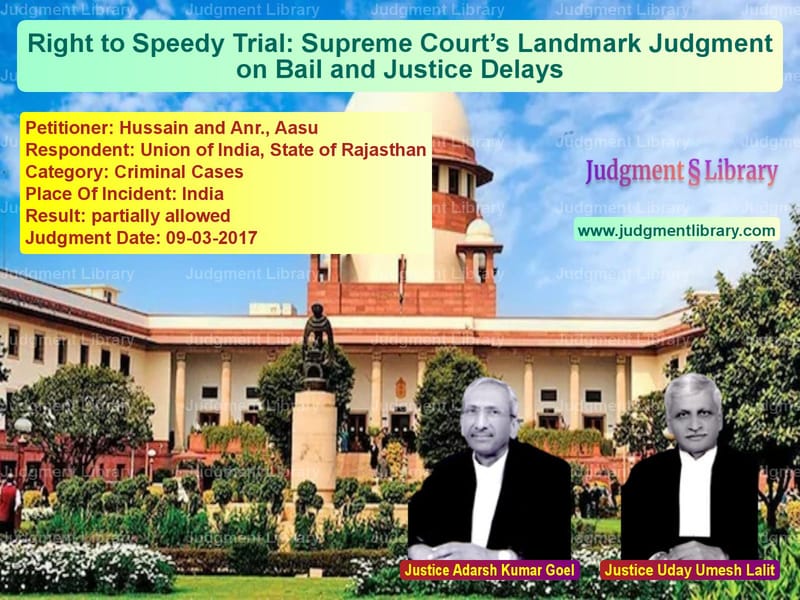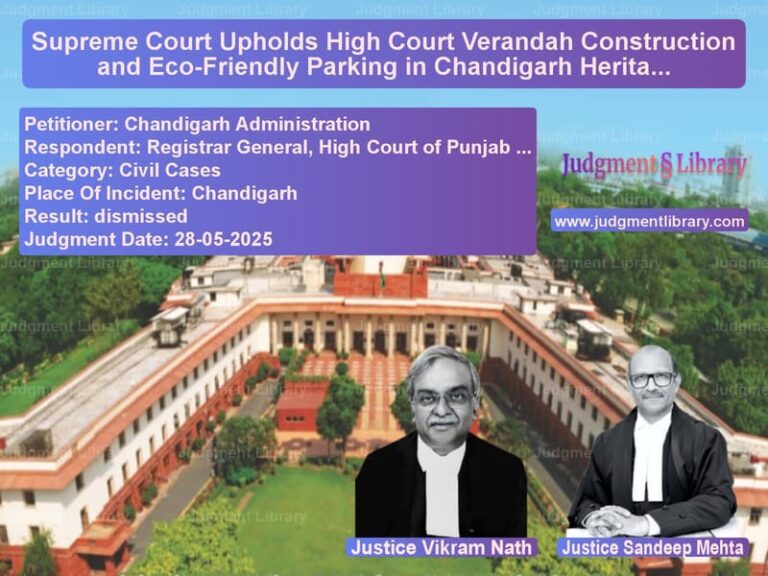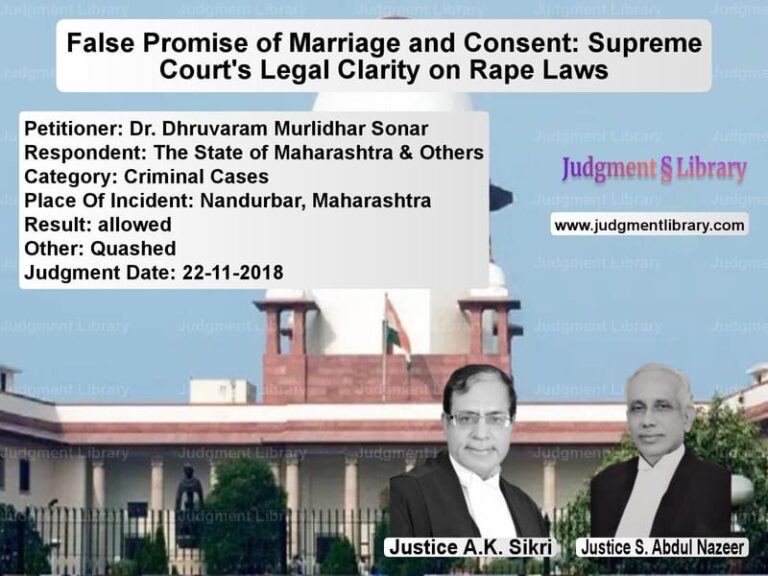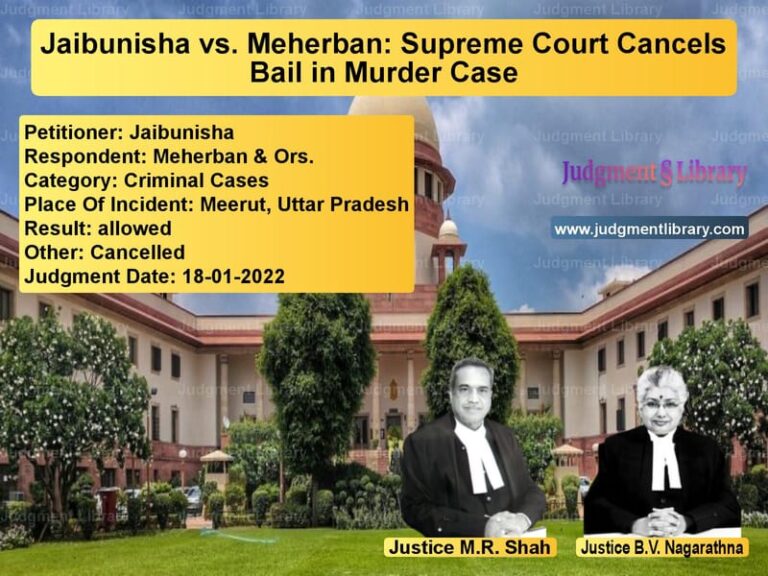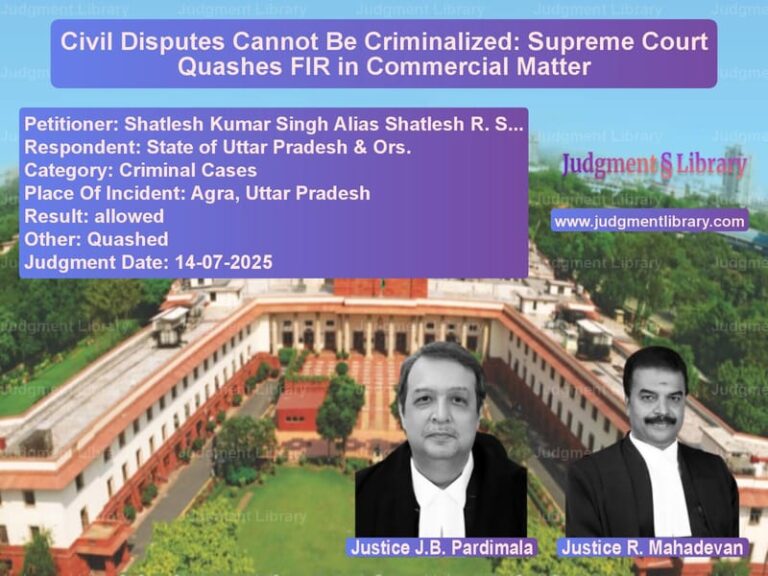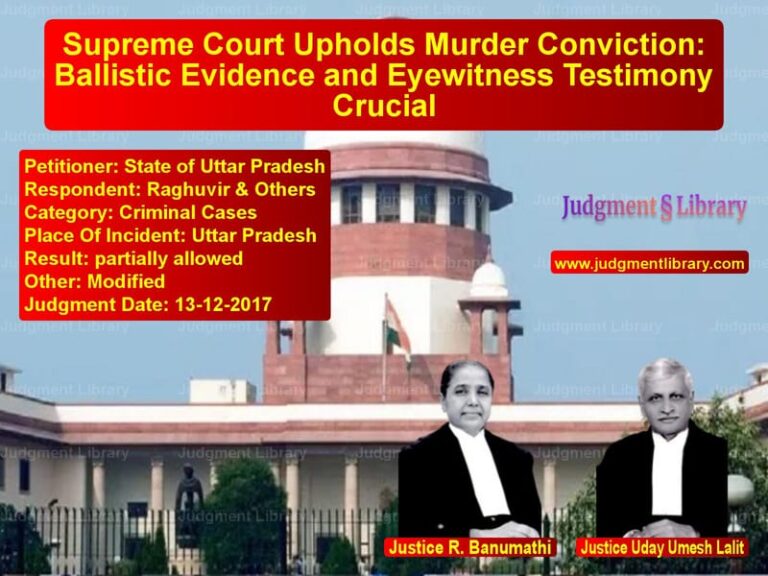Right to Speedy Trial: Supreme Court’s Landmark Judgment on Bail and Justice Delays
The Supreme Court of India, in a crucial ruling, addressed the fundamental right to a speedy trial and the conditions under which bail should be granted when trials and appeals remain pending for an extended period. The case involved two separate appeals: Hussain and Anr. vs. Union of India and Aasu vs. State of Rajasthan. The Court considered the prolonged detention of the appellants and the constitutional mandate for expeditious trials under Article 21 of the Indian Constitution.
Background of the Case
The first appellant, Hussain and another, had been in custody since August 4, 2013, for alleged offenses under Section 21(c) of the Narcotic Drugs and Psychotropic Substances Act, 1985 (NDPS Act). Their bail application had been rejected despite the long duration of their incarceration. In the second case, Aasu was convicted under Section 302 IPC and sentenced to life imprisonment. He had been in custody since January 11, 2009, and was awaiting the outcome of his appeal, with his bail application also being dismissed.
The appellants argued that prolonged detention without a trial conclusion or appeal disposal violates their fundamental rights. The Supreme Court took up the case to examine whether the delay in proceedings could justify bail under specific circumstances.
Key Legal Issues
- Whether prolonged incarceration without trial conclusion violates Article 21 of the Indian Constitution?
- Whether bail should be granted in cases where the appeal or trial is delayed beyond a reasonable timeframe?
- The role of the judiciary and the government in ensuring a speedy trial.
Petitioners’ Arguments
The petitioners argued that speedy trial is an inherent fundamental right under Article 21. They referred to precedents such as Abdul Rehman Antulay v. R.S. Nayak (1992) 1 SCC 225, where the Court had held that unjustified delays in criminal proceedings violate the constitutional rights of the accused.
The petitioners contended that since they had already spent several years in custody, their continued detention was unjustified and infringed on their right to liberty. They emphasized that Section 436A of the Code of Criminal Procedure (CrPC) mandates bail if an undertrial has served half the maximum prescribed sentence for their alleged offense.
Respondents’ Arguments
The Union of India and the State of Rajasthan opposed the bail applications, arguing that the nature of the offenses warranted continued detention. They contended that granting bail could set a precedent leading to the release of accused individuals in serious offenses, thereby affecting public interest and justice delivery.
They also maintained that Section 436A CrPC does not apply to convicts and only applies to undertrials, thus rendering the plea for bail in the second case invalid. The government emphasized that procedural delays could not be used as grounds for bail in cases involving heinous crimes.
Supreme Court’s Observations
The Court extensively examined the principles laid down in previous cases regarding speedy trial rights. The judgment stated:
“The deprivation of personal liberty without ensuring a speedy trial is inconsistent with Article 21. While some period of detention may be unavoidable, the duration of incarceration pending trial or appeal cannot be unreasonably long.”
The Court also referenced cases such as Hussainara Khatoon v. Home Secretary, State of Bihar, which emphasized that undertrials should not languish in jail merely due to their inability to furnish bail.
Directions Issued by the Court
- Bail applications should be decided within one week in subordinate courts and within two to three weeks in High Courts.
- Magisterial trials, where the accused is in custody, should conclude within six months, while sessions trials should be completed within two years.
- All cases pending for more than five years should be disposed of by the end of the year.
- Undertrials who have served a sentence longer than what is likely upon conviction should be released on a personal bond.
Implementation and Monitoring
The Supreme Court directed all High Courts to establish monitoring committees to track pending cases and ensure timely disposal. It also recommended the use of technology such as video conferencing to reduce procedural delays.
The judgment highlighted the urgent need for judicial reforms, including increasing judicial strength, reducing adjournments, and ensuring proper legal aid for undertrials. The Court emphasized that a proactive approach by the judiciary and executive is required to uphold the right to a speedy trial.
Conclusion
The ruling in Hussain and Anr. vs. Union of India and Aasu vs. State of Rajasthan reinforces the constitutional guarantee of a speedy trial. It establishes clear guidelines for granting bail in cases of prolonged detention and underscores the judiciary’s role in protecting fundamental rights. This landmark decision is expected to significantly impact India’s criminal justice system, ensuring that justice is not delayed or denied.
Don’t miss out on the full details! Download the complete judgment in PDF format below and gain valuable insights instantly!
Download Judgment: Hussain and Anr., Aa vs Union of India, Stat Supreme Court of India Judgment Dated 09-03-2017.pdf
Direct Downlaod Judgment: Direct downlaod this Judgment
See all petitions in Bail and Anticipatory Bail
See all petitions in Custodial Deaths and Police Misconduct
See all petitions in Judgment by Adarsh Kumar Goel
See all petitions in Judgment by Uday Umesh Lalit
See all petitions in partially allowed
See all petitions in supreme court of India judgments March 2017
See all petitions in 2017 judgments
See all posts in Criminal Cases Category
See all allowed petitions in Criminal Cases Category
See all Dismissed petitions in Criminal Cases Category
See all partially allowed petitions in Criminal Cases Category

